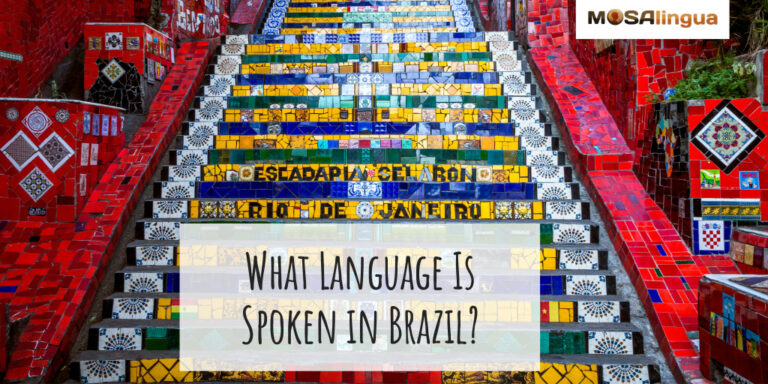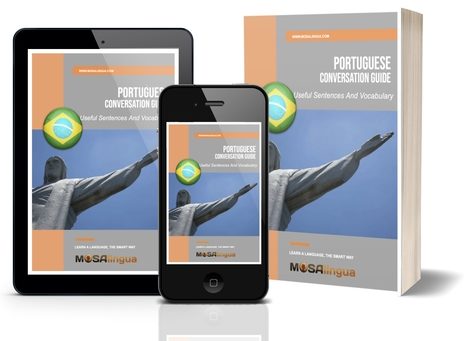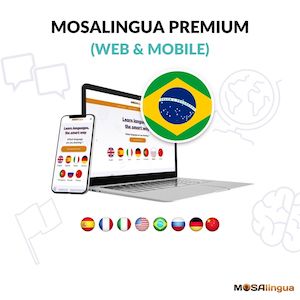If you have dreams of taking a trip to Brazil (who doesn’t?!), it’s worth taking a moment to learn about the country’s very unique linguistic landscape. Many people may not realize that Brazil is a truly multilingual country. So today, we’re going to have a look at this question – what language(s) do they speak in Brazil? Or if you already know the answer and simply want to learn one of the ten most-spoken languages in the world, we think you’ll be interested to learn more about the linguistic diversity you’re likely to encounter if you travel to Brazil.

What’s inside…
What Language Do They Speak in Brazil?
The most widely spoken language in Brazil is Portuguese! Okay, that one was easy… But it’s not silly to ask about the languages spoken in Brazil, because you can come across so many other languages within the country.
Portuguese is the official language of Brazil (and Portugal, of course). However, people also speak it in numerous other countries. That’s because Portuguese colonial expansion in the 15th and 16th centuries stretched from Japan to South America, via Africa.
Over time, the Portuguese language split into two main variants in both written and spoken forms: European Portuguese and Brazilian Portuguese. They differ in both vocabulary and pronunciation. Because of Brazil’s size, about 80% of Portuguese speakers live in Brazil, so that’s the variant we teach in our app.
If you’re planning a trip, you’ll want to make sure you learn these essential Portuguese vocabulary words. The MosaLingua Brazilian Portuguese app mainly teaches the Brazilian variant to maximize your chances of communicating and practicing the language. However, it also contains some vocabulary and phrases specific to European Portuguese. In any case, these aren’t two entirely different languages, so you won’t have any problem making yourself understood, even in Lisbon, if you use our app 😉
If you want to dive further into the particularities of the Brazilian variant, our instructor Lize has put together a great lesson on Brazilian Portuguese slang.
If you have a trip coming up, be sure to grab our handy Portuguese conversation guide:
How Many Languages Are Spoken in Brazil?
Brazil is a huge country—the fifth largest in the world by total area, and also the sixth most populous. With over 215 million inhabitants and many indigenous communities, the 2010 census indicated there are 274 different languages spoken in Brazil! But just think – before the arrival of the Portuguese in the 16th century, there were an estimated 1,075 languages in Brazil 😢
European languages in Brazil
But what’s one of the most common languages in Brazil after Portuguese? German! The reason for that is emigration, especially in the 1940s. And even today, several communities of German origin, found mainly in the south of the country, keep their native dialects alive.
Another curious fact: Did you know that there are about 10 million people of Italian descent living in São Paulo? This makes it the highest concentration of Italians anywhere in the world. (To put that into context, the population of the Rome metropolitan area is about 4.3 million.) As a result, Italian is also a widely spoken and studied language in Brazil! There’s even an Italian dialect created from Venetian, il Talian, spoken as a first language.
Start improving your Portuguese today
Want to improve your Portuguese?
Good news: we can help!
More good news: you can get started for free! With your free trial, you can test drive the most effective method for learning Portuguese for the next 15 days !Vocabulary flashcards, videos with subtitles, audiobooks, articles adapted to your level – with MosaLingua Premium (Web & Mobile), you’ll have access to all this and more. Get started right now. It’s free—and risk-free—to try!
Is Brazil a Spanish-speaking country?
It might come as a surprise, considering that Brazil shares borders with several Spanish-speaking countries, but relatively few people in Brazil speak Spanish. Only about 4% of the country’s population speaks Spanish. But because the country is so large, 4% of the population works out to about 8 million speakers. The highest concentrations of Spanish speakers are generally in border regions.
Indigenous languages of Brazil
As for indigenous languages, the high number of languages unfortunately correlates to a very low number of speakers. In fact, in 2005 there were fewer than 40,000 speakers of indigenous languages.
Brazil had a lingua franca, established by Portuguese colonizers in the 16th century in order to facilitate communication between indigenous groups: the Língua Geral. One variant (Língua Geral Paulista) is extinct. The other, Língua Geral Amazônica, gave rise to one of the indigenous languages still spoken today, Nheengatu.
After many years of suppression, the Nheengatu language has seen a revitalization in recent years. The majority of inhabitants in São Gabriel da Cachoeira in northwestern Brazil still speak it. In 2002, it became an official language of the municipality. Additionally, apps, websites, and courses have helped the language gain new speakers. However, UNESCO’s Atlas of the World’s Languages in Danger still classifies Nheengatu as “severely endangered.”
Why is Portuguese the Official Language of Brazil?
We touched on it a bit earlier, but the simple answer to this question is commercial trade and colonialism. Portuguese explorers “discovered” Brazil in 1500 and established the first Portuguese settlement in 1532. Agriculture, gold, and diamonds were the main industries the Portuguese pursued in Brazil.
The relations between the European settlers and the indigenous Brazilians were fairly typical of the era, and can generally be characterized by violence, disease, and death. After more than three hundred years of strong Portuguese presence and influence, Brazil gained its independence in 1822. But of course, Brazil’s national language, Portuguese, didn’t change.
Next Steps…
Now that you know what language they speak in Brazil, you probably want to learn more about the Portuguese language! Check out these other articles:






Comments